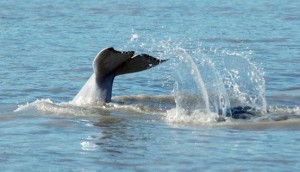
Two environmental groups are suing the Trump administration for its decision allowing Hilcorp to disturb beluga whales as it explores Cook Inlet for offshore oil and gas.
Cook Inletkeeper is one of groups suing. Advocacy Director Bob Shavelson says seismic blasts and other exploration work would devastate a population already suffering from the effects of climate change and other factors.
“The Cook Inlet beluga whales are literally teetering on the edge of extinction,” he said. “There was a general idea that, with the halt to Native subsistence hunting in 1999, that the population would rebound. But that didn’t occur.”
Cook Inletkeeper and its partner in the lawsuit, the Center for Biological Diversity, note that Hilcorp doesn’t have a clean record in Alaska, pointing to several citations, fines and warning letters the company has received from regulators.
Hilcorp has been operating in Alaska since 2012. It’s the state’s largest private oil company, and announced last week it’s buying BP’s entire Alaska business. The company did not respond to a request for an interview.
Measures to protect the whales are in the rules the National Marine Fisheries Service issued in July for Hilcorp’s work in Cook Inlet. They say, among other things, that the company has to fly over the area to look for belugas before conducting seismic surveys, and crews have to ramp up gradually when doing loud work to give whales a chance to leave the area.
The lawsuit claims the protections are inadequate.
Cook Inlet was estimated to have more than a thousand belugas in the 1970s but their number has dwindled to less than 350, according to the Marine Mammal Commission.
The lawsuit was filed in federal District Court in Alaska. The defendants include Commerce Secretary Wilbur Ross and the National Marine Fisheries Service.
Liz Ruskin is the Washington, D.C., correspondent at Alaska Public Media. Reach her at lruskin@alaskapublic.org. Read more about Liz here.





